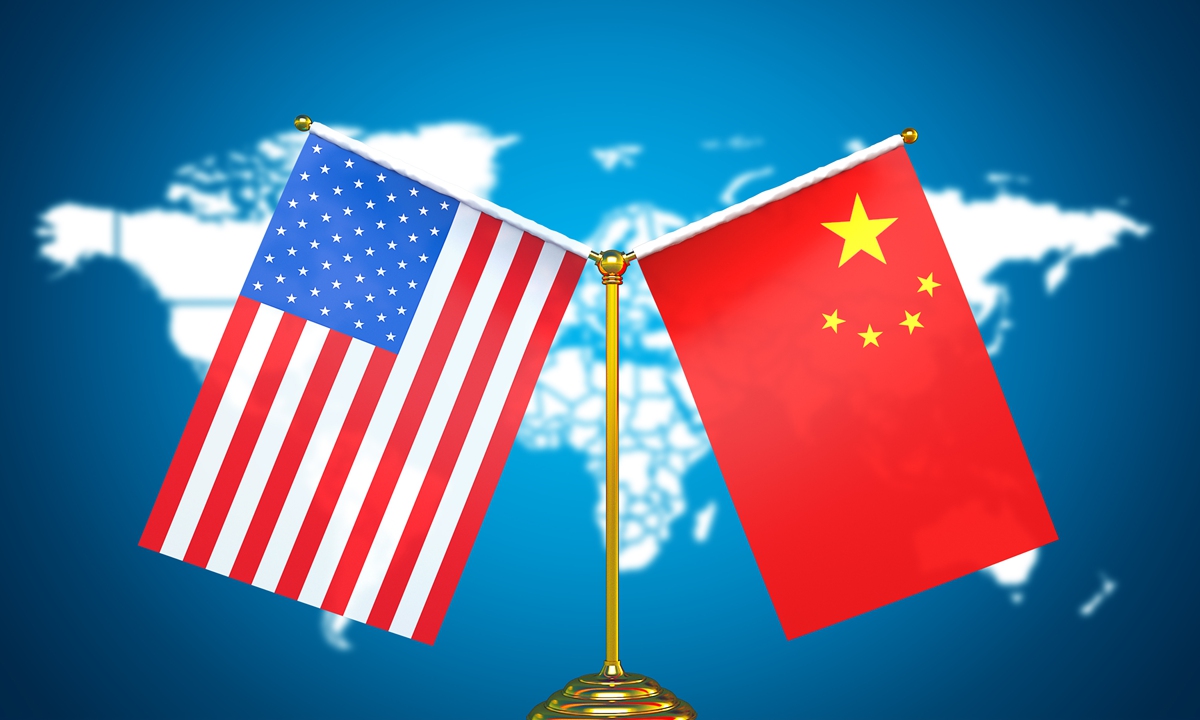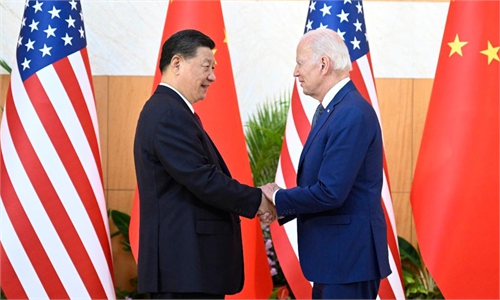US urged to take concrete moves to build guardrails, not play 'Taiwan card' ahead of Xi-Biden meeting at G20

Photo: VCG
The world has been paying close attention to the upcoming meeting between Chinese President Xi Jinping and US President Joe Biden in Bali, Indonesia on Monday, as many observers see it as an opportunity for the two countries to ease strained relations, while Chinese analysts urged the Biden administration to stop playing the Taiwan card and making further provocations, and take tangible measures to build guardrails for China-US relations.
China's Foreign Ministry on Friday announced President Xi and Biden's meeting while releasing information on Xi's attendance at the 17th G20 Summit in Indonesia from November 14 to 17 and the 29th APEC Economic Leaders' Meeting in Thailand from November 17 to 19.
This will be the first offline face-to-face talk between Xi and Biden since the latter became president in January 2021, as previously the two leaders had several conversations via video or phone. Analysts said that this meeting has attracted global attention as it offers an opportunity for China and the US to stabilize their relations when the ties have sunk to the lowest level in decades due to the US' provocations, especially on the Taiwan question.
The arrangement of the meeting is itself a breakthrough since there has been no offline face-to-face talk between the top leaders from China and the US in recent years, which also reflects how tense bilateral relations have become, Lü Xiang, a research fellow at the Chinese Academy of Social Sciences, told the Global Times.
After the US House Speaker Nancy Pelosi's highly provocative visit to the island of Taiwan, China and the US have entered into a strategic showdown, which means with one step further, they may even enter a military conflict. Both sides want to avoid such a dangerous situation, said Lü, noting that whether this meeting would help cool down the tense relations remains to be seen, but relaxing China-US relations fits the interests of the two countries and global expectations.
This meeting was scheduled after the conclusion of the 20th National Congress of the Communist Party of China and the midterm elections in the US - two major political events in each country, and the top leaders will take the chance to exchange views on issues of core interests and the future direction of each country, Li Haidong, a professor from the Institute of International Relations at the China Foreign Affairs University, told the Global Times.
China-US relations are at a crucial point and talks between top leaders would help make bilateral relations controllable. The positive signal of the top leaders' meeting between China and the US will also inject stability into the world, Li said.
Also, there are urgent issues that call for China-US cooperation, including climate change and nuclear proliferation. The Ukraine crisis and its spillover effect on the world as well as increasing global challenges also need joint efforts of the international community and China and the US - the largest and second largest economies in the world should also play the leading role, analysts said.
On Wednesday, Biden told reporters at the White House that during his meeting with President Xi, he wants to lay out what each of their red lines are.
A US senior administration official was quoted by Reuters in a report on Thursday as saying that Biden "believes it is critical to build a floor for the relationship and ensure that there are rules of the road that bound our competition."
By using the words "floor", "guardrails" and "redline," the Biden administration wants to show it wants competition not clashes, but its worries over bilateral relations spiraling out of control have increased, said Li.
President Xi had a video meeting with Biden in November 2021, during which Biden used the word "guardrails" to say that China and the US need to establish some "commonsense guardrails."
The Biden administration and US politicians want to take confrontational measures toward China but do not want such confrontation to go out of control and hurt their interests. This is why they are keen on engaging in cutthroat competition with China while also calling on China to build guardrails to bilateral relations, said analysts.
For China, the redline has always been clear and firm - on the Taiwan question, the US should respect and follow the Three Joint Communiques and the UN resolutions related to China's sovereignty. However, the US has gone astray too far and played with fire on the question, Li said.
Currently, it is not China that is challenging the US' redline, it is the US that is making provocations toward China not only on the Taiwan question, but also on economy and trade by continuously imposing sanctions, analysts said, referring to US National Security adviser Jake Sullivan's latest remarks.
While announcing the Xi-Biden meeting on Thursday, Sullivan told reporters that the administration would brief the island of Taiwan on the results of the meeting, aiming to make the island feel "secure and comfortable" about US support.
In response, Chinese Foreign Ministry spokesperson Zhao Lijian told a press conference on Friday that what the US said about briefing Taiwan on the meeting between the Chinese and the US heads of state gravely violates the one-China principle and the stipulations of the three China-US joint communiqués.
"This is truly egregious, and China firmly rejects this," said Zhao.
It is ridiculous for Sullivan to make such remarks, as the only way to make the people in the island of Taiwan feel safe is for the US to stop supporting and encouraging separatist forces, said Lü, noting that the previous visit of Pelosi to the island had intensified local residents' worries and made the cross-Straits situation more strained, said Lü.
It is highly possible that Biden will become a lame duck president as the GOP is highly likely to win control of the House. In the last two years of Biden's presidency, Republicans will make more noise on China policies, and whether the Biden administration is willing and capable to manage disputes for China-US relations or prematurely enter "garbage time" remains unknown, said Lü.
Some experts reached by the Global Times also noted that they are not optimistic about whether the US would change its attitude after this meeting, since it has always played the trick of "say one thing and do another", and urged the US to fully implement the consensus reached by top leaders in previous meetings to create a better environment for the upcoming meeting.

